

 |
|
|
|
 |
Latest News2021 EDINBURGH INTERNATIONAL FESTIVAL FRINGE WORLD PREMIERE Objektiv Collective presents PADDY THE COPEWritten and directed by Raymond RossNetherbow Theatre, Scottish Storytelling Centre 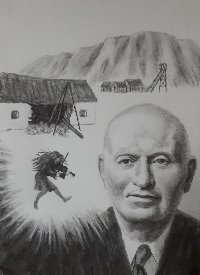
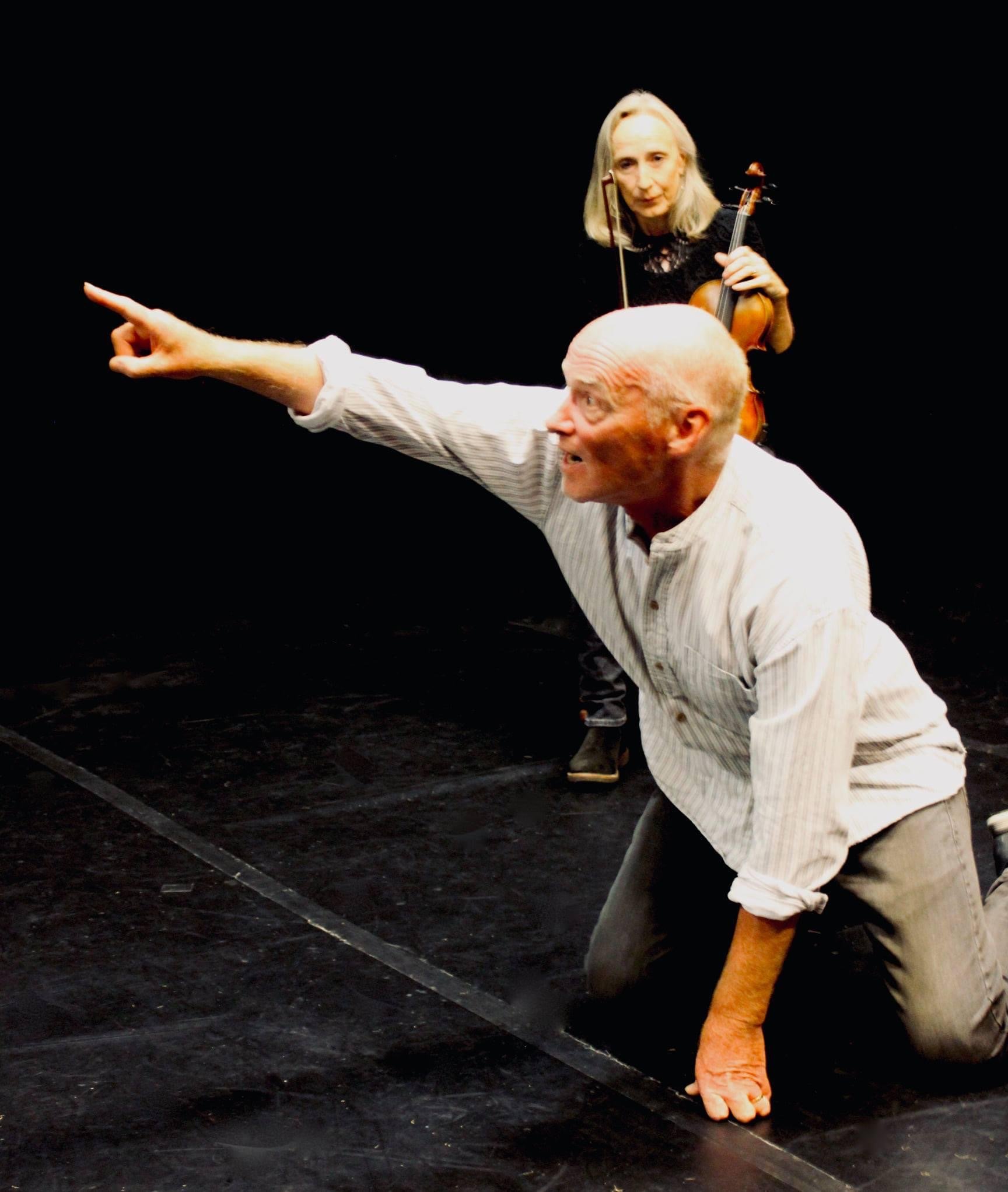
photo: Scott Anderson Meet legendary Patrick Gallagher (1871-1966) in all his colourful, comic, adventurous and profoundly principled glory as he spreads social revolution in Ireland aided and inspired by the Scottish Co-operative Movement (and the Fairy Fiddler of Cleendra). Gombeen Men Beware! West Lothian meets West Donegal as shale miner Patrick Gallagher (JohnMcColl) returns to his native sod imbued with the co-operative principles he’s learned in Scotland to spread social revolution in cahoots with the Fairy Fiddler of Cleendra (Sue Muir), taking on the Gombeen merchants, Dublin Castle, the British Army and the Black and Tans in the process. A tale of lyricism and beauty, of childhood slavery and industrial struggle, of colourful adventure and comic cantraips, of love, hope and faith in common humanity – and of success against all the odds. And all of it quite true! The World Premiere (Edinburgh Festival Fringe) of Paddy the Cope (written and directed by Raymond Ross, presented by the Objektiv Collective with John McColl as Paddy and Sue Muir as the Fairy Fiddler) is at the Netherbow Theatre, Scottish Storytelling Centre, 43-45 High Street, Edinburgh Aug 7, 9, 11, 14, 16, 18, (Aug 20 matinee 4pm), 22, 24, 26, 30 at 7pm. Box office: 0131 556 9579 www.scottishstorytellingcentre.com Duration: 1hr 20mins Age range: 12 + The playwright acknowledges with gratitude The Templecrone Press, Dungloe, Ireland for all copyright permissions and Creative Scotland for their support for his writing of the script. From The National, 7 August 2021 By Raymond Ross PATRICK Gallagher (1871-1966) – to give the legendary “Paddy the Cope” his proper Sunday name – is a figure who for many has the status of working-class hero in both Scotland and Ireland. It was Paddy’s experiences as a shale-miner in West Lothian which led him into social revolution when he returned to his native Donegal to found the Templecrone Co-operative Society in 1906. “The Cope”, as it became known, was to improve vastly the impoverished lives of the people of West Donegal. With the sustained (and crucial) support of the Scottish Co-operative Movement, Paddy was to take on the “Gombeen” merchants – the post-Famine monopolists and usurers who helped keep the peasantry in abject poverty – and the imperial powers of Dublin Castle, as well as, during the War of Independence (1918-21) the British Army and the infamous Black and Tans who sought to destroy the nascent Co-operative Movement. The establishment of the Cope was inspired by Paddy’s membership of the West Calder Co-op which he joined at its Pumpherston Branch; and it was the £800 savings he and his wife Sally had eventually accrued there which was to provide the initial capital to launch the Cope (which today has an annual turnover in excess of €17 million) when they finally returned to Dungloe and the Rosses in 1905. Paddy began his working life as a child-labourer aged nine: one of the many children hired out across the more fertile Protestant owned farms of the Laggan in East Donegal (established as a “Plantation Precinct” in the C17th) to earn a pittance to help pay the rents and the Gombeen debts. Bought for a handful of shillings – and if they were lucky a pair of shoes – they worked these scattered farms six months at a time. It was in all but name child slavery. Paddy first came to Scotland as a teenage farm labourer in the Borders before being drawn to the booming shale- oil industry in West Lothian where the work was hard and dangerous but better paid. And it was here he was mainly to work and, with his wife Sally at the helm, to learn the virtues of co-operation before they returned to their native Donegal to foment a social revolution. His childhood experiences of poverty, injustice and slavery left an indelible mark on him. But it’s clear from his colourful, humorous, and vibrant autobiography My Story: Paddy the Cope that it was Scotland (as well as Sally) that helped make Paddy the profoundly principled man of action that he became and set him on his near incredible journey spreading successfully the spirit of communal effort in spite of being threatened, harassed, attacked, blockaded and jailed, and almost ending up in gruesome and deadly Ballykinlar, the first British mass internment camp in Ireland, during the War of Independence. What saw him through? He had a deeply Catholic sense of social justice. He had Sally. He had (eventually) strong local backing. He had the Scottish Co-operative Wholesale Society always in support. And (he believed) he had Tuatha de Danann (of whom Yeats and Lady Gregory often spoke) at his side. He was the most rational of men but he disdained anyone who denied the existence of these Fairy Folk (in local habitation and name: “the Wee Princes of Cleendra”). When, for example, he “accidentally” liberated a consignment of arms and ammunition bound for the blockading British military forces in Dungloe he took it out to the Fairy Rock in Cleendra and hid it under a holly bush in the safe keeping of the Wee Princes until Peadar O’Donnell and the local volunteers could secure it and make good use of it themselves… Like the writer Patrick MacGill (another Donegal man, of course), Paddy is part of the fabric of Scottish (as well as Irish) working-class culture and history. I first came over his “legend” growing up in the shale country of West Lothian (where my maternal grandfather, Jimmy Coyne – who hailed from County Mayo – worked in some of the same mines around the same time as Paddy). Paddy’s autobiography, like MacGill’s novels of navvy life in Scotland (such as Children of the Dead End and Moleskin Joe) would be passed from hand to hand, house to house in the miners’ rows and council houses in the 1950s and 60s. FIRST published in London (1939) and New York (1942), Paddy’s best-selling autobiography was to see several updated editions and many reprints in both Ireland and the USA. Indeed, the film director and producer Michael Powell optioned the book in 1946: but the film (which was to star Cyril Cusack) unfortunately never came to fruition. Paddy does, however, remain a legendary figure whose name still resonates in Scotland although the actual details of his life and character are less well-known, all of which suggests the time is ripe for his return to Scotland; and for Scottish audiences to be inspired by his spirit through a dramatic evocation of his life and times, particularly his formative experiences in Scotland and his embodiment of the international co-operative ethos of which we have much need today. Paddy’s fame did spread far and wide in his own day. The whole stadium stood to applaud him when he was Guest of Honour at the All Ireland at Croke Park, New York, in 1947 (the only time the game was played outside Ireland, this was to commemorate the 100th anniversary of the Famine). That certainly goes some way to measuring the achievement of the man who once received a letter from America simply addressed to “Paddy the Cope, Ireland”. FOUR STAR REVIEW inTHE SCOTSMAN by Joyce McMillan August 25th 2021 At the Scottish Storytelling Centre, Raymond Ross’s new Theatre Objektiv play Paddy The Cope **** essentially offers an answer for men – and women – uncertain what to do with their lives, and their strength; use them, if you can, to organise for a better world, and to help empower those who are suffering poverty and oppression. In a brief but hugely dynamic hour, Paddy The Cope tells the true story of Patrick Gallagher of Donegal, who came to Scotland to work in the shale pits of West Lothian in the late 19th century, and witnessed at first hand the value of the co-operative movement, as it provided working people with the goods and financial services they needed, at prices they could afford. Back in Donegal in the 1890s, Paddy and his wife Sally therefore set up a co-operative for their local community, attracting the wrath of bosses, shopkeepers, and the local Catholic Church alike. In the end, though, Paddy’s “Cope” triumphed, and he became a much-loved leading figure of the co-operative movement in Ireland. In John McColl’s powerful solo performance – accompanied throughout by eloquent and gorgeous fiddle music from Sue Muir – Paddy’s story is told with a vivid richness of incident that casts a huge light on the intense traffic of people, trade and ideas between Scotland and Ireland in the late 19th century; and on how the growing labour and co-operative movement of those days united people who have since often been tragically divided, by conflicts that serve the interests only of those who already hold power, and do not wish to let it go. FOUR STAR REVIEW in BROADWAY BABY by Editor-in-Chief Richard Beck August 14th 2021Paddy the Cope, written and directed by Raymond Ross, makes its world premiere at the Edinburgh Festival Fringe in the delightful Netherbow Theatre at the Scottish Storytelling Centre, courtesy of The Objektiv Collective. The work is a musically accompanied monologue in which John McColl relates the life and times of Patrick Gallagher (1871-1966), a colourful, comic and adventurous social revolutionary who was inspired and assisted by the Scottish Co-operative Movement. He became a zealous activist in spreading its principles and founded the Templecrone Co-operative Society in 1906 in his native Donegal, achieving the status of a hero and ultimately of a legend. He was a fearless character and in his time he challenged the vested interests of Dublin Castle, the British Army, the Black and Tans and the Gombeen merchants. McColl’s lyrical Irish accent makes for easy and engaging listening, and it’s no big issue if those of us without an ear for it miss the odd word. The message is as much in his physicality and the wide range of tones he employs as it is in the story. He has a multitude of tales to tell that chart Gallagher’s life from what amounted to childhood slavery, through the endless conflicts with authority, his marriage to Sally and family life and the ultimate glory of being Guest of Honour at the All Ireland at Croke Park, New York, in 1947. Although a rational man and a Roman Catholic he had a deeply rooted cultural belief in the existence of fairies and that the pantheon of pre-Christian deities, the Tuatha dé Danann, were always by his side. In particular he returns time and again to the aid afforded by the Fairy Fiddler of Cleendra. Sue Muir becomes the incarnation of this most important helper. Her melodies and sound effects on the violin at times accompany the narrative, heightening its impact and also provide brief interludes that give time for reflection and often amusingly making a musical comment. The Scottish Storytelling Centre maintains that its ‘ethos is summed up nicely by the old Scottish proverb, “The story is told eye to eye, mind to mind and heart to heart”’. McColl and Muir certainly take that on board in this production.
EDINBURGH FESTIVAL FRINGE 2019 BURNS FOR BRUNCH
Written by Raymond Raszkowski Ross HAMISH HENDERSON – On the radical road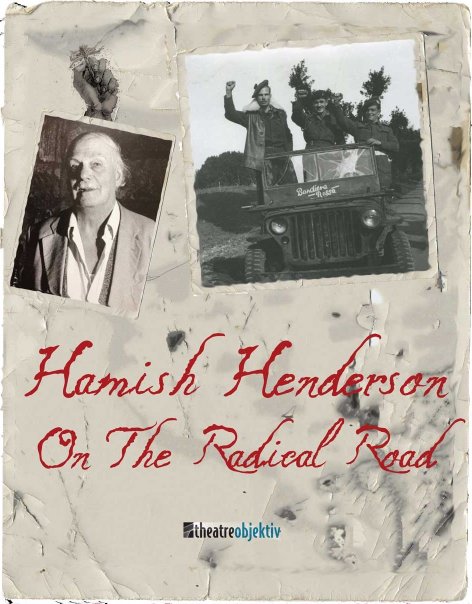
Scripted from the poems and songs of Hamish Henderson
Reviews of Theatre Objektiv’s Hamish Henderson: On the Radical Road
PREVIOUS PRODUCTIONSON THE RADICAL ROADEnacting Hamish Henderson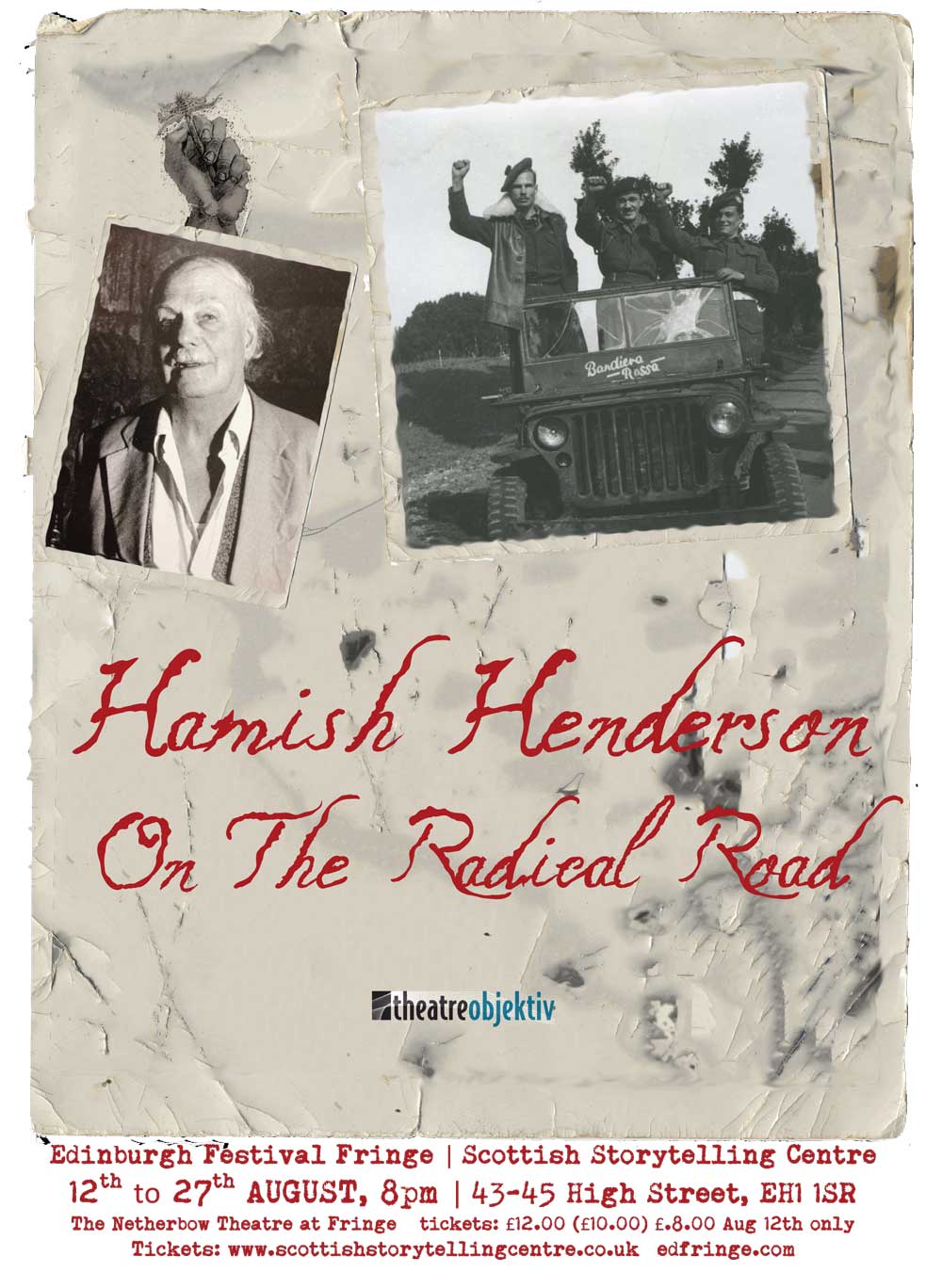
An evocative and innovative drama shaped and sculpted from the poetry and songs of Hamish Henderson (1919-2002) taking us on a journey across Highland, Lowland and industrial landscapes, through childhood trauma, spiritual growth and exploration into the exhilarating, cacophonous and deeply morally challenging theatres of war in the Desert Campaign, the Invasion and Liberation of Sicily and Italy; and the consequent struggles for a new self-knowledge and cultural alignment in a battleground of conflicting experiences, emotions and ideas in post-war and present-day Scotland and Europe. A uniquely structured, experimental, dramatic evocation of the man and his ideas through poetry and songs without narrative intervention; a radical fusion employing a lyrical and percussive soundscape, movement and visual image, choral and individual voices, for the first time presenting a holistic and seamless view of the poet and songwriter in a new and challenging dramatic whole. A fully embodied, full-blooded enactment of the ‘Radical Road’ which Henderson dedicated his life to, offering us a fresh and vital perspective on who we are, where we came from and how we might move forward by embracing Henderson’s vision of a people’s culture: a new democratic art for here and now.
Scripted and directed by Raymond Raszkowski Ross 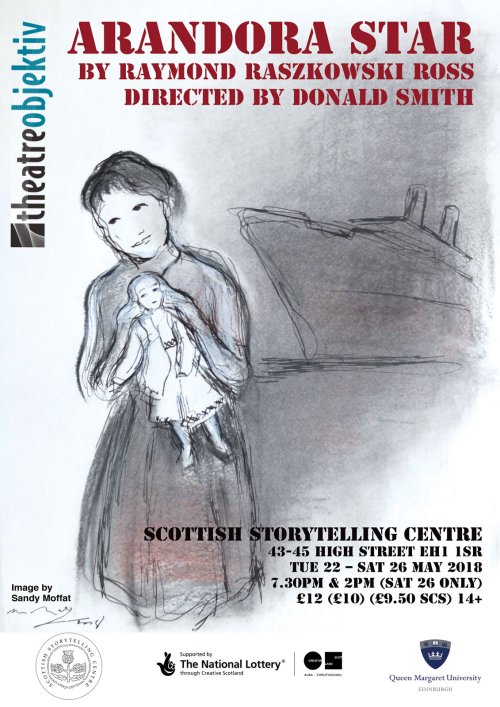
World Premiere ARANDORA STAR Theatre ObjektivBy Raymond Raszkowski Ross A vibrant, evocative full-length drama about the controversial sinking of the SS Arandora Star on July 2nd 1940, in which some 700 ‘enemy aliens’, many of them Scottish-Italians, lost their lives while being transported to Canada by the British Government. A strong ensemble cast enact a Dantesque passion of love, hope and determination. We are in the midst of muddle, mishap and mess; of preconceptions and prejudice; of war-time exigencies and political misadventure; as well as of ‘cover up’ and suppression; but, equally and perhaps more importantly, Arandora Star is about empathy and understanding, innocence and ideals, shared laughter in the face of adversity, loyalty and common humanity. The ship on which we sail symbolises the truth of all war: most victims are innocent civilian non-combatants. “Collar the lot!” Churchill had ordered when Mussolini declared war on June 10th 1940; and collar them they did. The Italian community in Scotland (Britain) was wrong-footed by Il Duce and they would pay a heavy price. The time is surely ripe for a multi-cultural Scotland to acknowledge its debt and to embrace fully the dedication on the Arandora Star Memorial in the grounds of St Andrew’s Cathedral Glasgow: Non vi scorderemo mai – Never will we forget you.
Scottish Storytelling Centre 43-45 High Street Edinburgh EH1 1SR Arandora Star headlines Scots Italian Incontro, a special week of Scottish Italian events at the Storytelling Centre: talks, storytelling, poetry reading, dance workshops and exhibitions including a series of drawings by legendary Scottish painter Sandy Moffat illustrating Theatre Objektiv’s rehearsal process and live performances of the play. PRESS RELEASE Arandora StarEdinburgh-based Theatre Objektiv to stage a vibrant, evocative full-length drama about the controversial sinking of the SS Arandora Star, July 2nd 1940, in which some 700 “enemy aliens”, many of them Scottish-Italians, lost their lives while being forcibly transported to Canada by the British Government . International significance and controversy The sinking of the SS Arandora Star remains controversial to this day and many government records have not yet been released although this tragic event traumatised the Italian community, the reverberations of which are still felt today This ensemble production with eight actors will cast dramatic light on how and why this tragedy occurred involving the deaths of settled Italian immigrants (including well-known anti-Fascists); acknowledged anti-Nazis (Austrian and German) who had escaped to Britain; and Jewish refugees fleeing Hitler; all of whom were designated “enemy aliens” and who drowned alongside captured German merchant sailors (POWs), British soldiers and Navy personnel as the result of a German U-Boat torpedo fired at an overcrowded, ill-prepared, un-escorted and unmarked ship (the Arandora Star had been denied a ‘Red Cross’ by HM Government) off the coast of neutral Ireland . Playwright Raymond Raszkowski Ross says “This is a significant story for Scottish theatre and Scottish audiences to embrace in terms of who we are and where we came from and in terms of what can happen when communities and/or diversity are challenged (over 4,000 Italian men from age 16 to 70 were interned without any trial or tribunal in 1940). Reflecting not only the contribution of the Italian community to Scottish life for over a century but also evoking the centrality of Italian culture to Scotland and to a European sensibility, a significant aim of Arandora Star is to share this sense of multi-cultural inheritance and community with audiences in Scotland to reflect different cultural perspectives at a time of shifting uncertainty.” Director Donald Smith says: “The play, which is peppered with comedy, irony and satire as well as with moments of intimacy, love and close affection, is about an artistic integrity which is moral as well as aesthetic. By shining a little light on a murky subject, of importance not only to the Italian community in Scotland, but of relevance to us all, we intend it to be genuinely thought-provoking: was what happened to that ship a war crime? A crime against humanity? We leave such questions to resonate with the audience and we give no answers but many may also (still) wonder why the British Government has never yet apologised for its role in this tragedy.” The ship on which we sail symbolises the truth of all war: most victims are innocent civilian non-combatants. Arandora Star headlines Scots Italian Incontro, a special week of Scottish Italian events at the Storytelling Centre: talks, storytelling, poetry reading, dance workshops and exhibitions including a series of drawings by legendary Scottish painter Sandy Moffat illustrating Theatre Objektiv’s rehearsal process and live performances of the play. Free (ticketed) talks include Professor Joseph Farrell: A Scottish Risorgimento; Cav. Mary Contini: Dear Olivia; Anne Pia: Crossing Identities and Transformed in Translation, a celebration of the comic and satirical sonnets of Giuseppe Belli in their original Romanesco and as owersett into Scots by Robert Garioch (with Giacomo Giuggioli and Raymond Ross). REVIEW OF ARANDORA STAR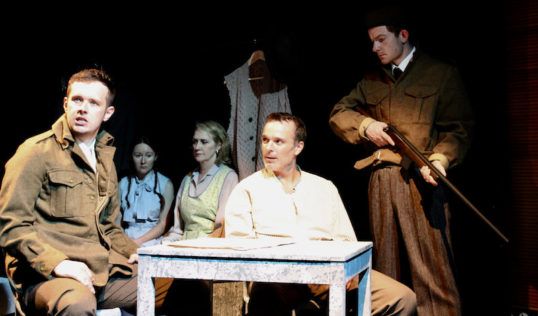 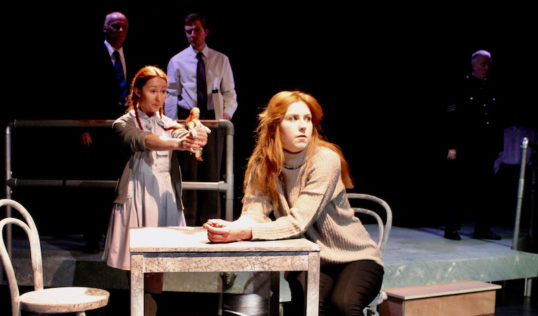
Reverent, haunting and heartfelt production AllEdinburghTheatre.com describes the show as a “reverent, haunting and heartfelt production of Arandora Star at the Scottish Storytelling Centre to Saturday… Andrea McKenzie convincingly demonstrates the physicality of a wide-eyed innocent, struggling to comprehend the shifting landscape and uncertainties of war. Maria perfectly encapsulates the struggle to define identity as a child of two worlds… Standout Performances The furthest ripple and the third setting for the narrative greets a now grown Maria played by the brilliant Catriona McFarlane valiantly facing an interrogation by the fearsome John McColl as the nameless Major. These are standout performances, as McFarlane and McColl’s scenes crackle with tension and bold characterisation… Overall, this is a production which tackles its message head-on, lending a greater scope to the murky side of British history whilst packing a stunning emotional punch sure to leave you thinking.” “I urge everyone to consider experiencing a most remarkable piece of theatre from Theatre Objektiv. I felt privileged to attend the world premiere at the Scottish Storytelling Centre.
The play is the most recent example of playwriting skills of Raymond Raszkowsky Ross. It is directed by Donald Smith with profound understanding of the text. The performance of each member of the cast is exemplary.
I recommend this unique piece of theatre to every politician in Scotland. It presents a stark reminder of the perils of a wartime Europe when an immigrant community is treated unjustly resulting in loss of life among those who chose Scotland as their new homeland far from Italy.
Arandora Star as an unforgettable piece of theatre benefits from an exhibition of drawings by Sandy Moffat made during the two-week period of rehearsals.” “This is a very powerful production from a magnificent cast, with outstanding performances from Gavin Paul as Oreste and Catriona McFarlane as Maria.
It witnesses to the men who lost their lives so pointlessly and lifts the veil of silence shrouding their fate.
Many of the members of the audience last night were members of that Scottish-Italian community, and their applause was whole-hearted
and prolonged at the end of the show.”
ON THE RADICAL ROADEnacting Hamish Henderson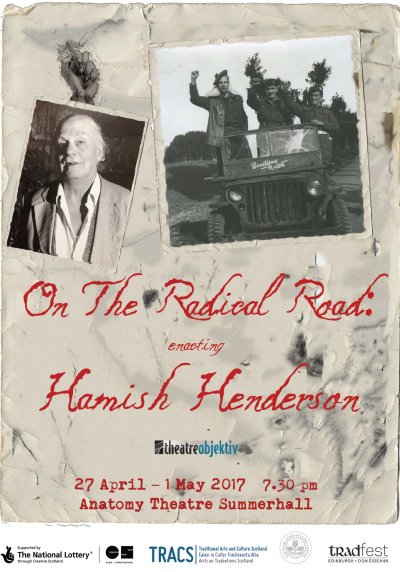
An evocative and innovative drama shaped and sculpted from the poetry and songs of Hamish Henderson (1919-2002) taking us on a journey across Highland, Lowland and industrial landscapes, through childhood trauma, spiritual growth and exploration into the exhilarating, cacophonous and deeply morally challenging theatres of war in the Desert Campaign, the Invasion and Liberation of Sicily and Italy; and the consequent struggles for a new self-knowledge and cultural alignment in a battleground of conflicting experiences, emotions and ideas in post-war and present-day Scotland and Europe. A uniquely structured, experimental, dramatic evocation of the man and his ideas through poetry and songs without narrative intervention; a radical fusion employing a lyrical and percussive soundscape, movement and visual image, choral and individual voices, for the first time presenting a holistic and seamless view of the poet and songwriter in a new and challenging dramatic whole. A fully embodied, full-blooded enactment of the ‘Radical Road’ which Henderson dedicated his life to, offering us a fresh and vital perspective on who we are, where we came from and how we might move forward by embracing Henderson’s vision of a people’s culture: a new democratic art for here and now. Scripted and directed by Raymond Raszkowski Ross Musical director Alastair McDonald Starring Isabella Jarrett, Alastair McDonald, Gavin Paul, Vanda De Luca 27 April - 1 May - 7.30pm (50 mins) – £12 (£10) Anatomy Theatre, SUMMERHALL - Edinburgh Booking: www.summerhall.co.uk - 0131 560 1581 www.tracscotland.org/tradfest - 0131 556 9579 FROM THURSO TO BERWICKA celebration of Morris Blythman
Scottish Storytelling Centre (Netherbow Theatre), Edinburgh
Starring Alastair McDonald Songs Republican and Radical, Nationalist and Internationalist. The inspiration of a generation and more of singers and songwriters. Today’s YES generation of cultural and political activists owe an immense debt to pioneers like Morris Blythman (1919-1981) who powered the Folk Revival in the dark days of post-WW2 Scotland carrying with them the spirit of the pre-war Scottish Literary Renaissance. Inspired by figures like John MacLean and James Connolly, Morris pursued the “perfervid spirit” of the Scots in his songs, poems and agitation. He initiated the idea of “demonstration singing” in Scotland in 1951 with his “Sangs o’ the Stane” (in support of the liberation of the Stone of Destiny from Westminster Abbey) while spearheading the Ding Dong Dollar anti-Polaris Balladeers of the 1960s – “the first real singing campaign ever undertaken in Scotland” – and scrieving sangs for SNP campaigns (including Winnie Ewing's famous by-election victory in Hamilton 1967). Along the radical road he also wrote some of the wittiest anti-Royalist songs ever penned. An evening to celebrate “The Scottish Breakaway”, “Lucky Wee Prince Chairlie”, “Sky High Joe”, “The Eskimo Republic” and “Perfervidum Ingenium Scotorum” courtesy of “The Glesca Eskimos”.
Tickets: £10.00 (£8.00)   
WOJTEK THE BEAR SPRING TOUR 2014
SPECIAL LONDON PERFORMANCES
SCOTTISH TOUR DATES Following his visit to Warsaw in early April (his second in six months) the irrepressible Wojtek the Bear will stride out across Scotland from Stranraer to Findhorn, from Coldingham to Dunkeld, and many places in between. Wojtek’s Scottish sojourn begins at the Scottish Storytelling Centre (Netherbow Theatre), Edinburgh, where he will strut his stuff from Thursday April 24th to Saturday April 26th 7.30pm (including Saturday matinee 3pm on 26th). Total theatre with live music composed and performed by Sue Muir. (Recommended age 12+) APRIL 2014 24th/25th/26th SCOTTISH STORYTELLING CENTRE, EDINBURGH 7.30pm, 0131 556 9579 26th only SCOTTISH STORYTELLING CENTRE, EDINBURGH 3.00pm matinee 29th NEWLANDS CENTRE, ROMANNO BRIDGE 7.00pm, 01968 660980 MAY 2014 1st COLDINGHAM HALL THEATRE, COLDINGHAM 7.30pm, www.coldingham.info/tickets 3rd THE BRUNTON, MUSSELBURGH 7.30pm, 0131 665 2240 4th COLDSTREAM COMMUNITY, CENTRE, COLDSTREAM 2.45pm, 01890 883332 6th EASTGATE THEATRE & ARTS CENTRE, PEEBLES 7.30pm, 01721 725777 7th BEACON ARTS CENTRE, GREENOCK 7.30pm, 01475 723723 8th RYAN CENTRE THEATRE,STRANRAER 7.30pm, 01776 703535 9th CUMBERNAULD THEATRE, KILDRUM, CUMBERNAULD 7.45pm, 01236 732887 10th UNIVERSAL HALL, FINDHORN 7.30pm, 01309 691170 11th EAST KILBRIDE ARTS CENTRE, EAST KILBRIDE 2.00pm, 01355 261000 13th BIRNAM ARTS CENTRE, DUNKELD 8.00pm, 01350 727674 18th CARNEGIE HALL, DUNFERMLINE 7.30pm, 01383 602302
Further information: WOJTEK THE BEAR GOES TO THE PALACE Theatre Objektiv’s award-winning production of Wojtek the Bear is to play the Palace of Culture in Warsaw this April at the invitation of the city’s English Theater Company (ETC). Following a successful six night run at Theater IMCA in Warsaw last November, ETC’s Artistic Director, Edward Dargiewicz, has now invited Theatre Objektiv to give eight performances at this prestigious Warsaw venue. “The play meets ETC’s criteria of superior artistic, literary and linguistic value. As a captivating lesson in history performed by a cast of talented Scottish actors, it received an incredibly positive audience response last November and that is why we have invited the company back – this time to perform at the Palace of Culture” says Mr Dargiewicz. Raymond Raszkowski Ross, Artistic Director of Theatre Objektiv and the author of the play, comments: “Our November audiences were deeply appreciative and both surprised and delighted with a Scottish show which saw the world through Polish eyes, particularly the Polish experience of World War II. We received, for example, three curtain calls on our opening night and a standing ovation on the last night. “We feel both honoured and excited that soldier bear Wojtek, the legendary hero of Monte Cassino and symbol of a Free Poland who ended his days in Edinburgh Zoo, should now tread the boards in the Palace of Culture where we hope, once again, Polish audiences will take him to their hearts.” Following the Warsaw visit, where Objektiv will play eight performances in four days (April 7th – 10th), Wojtek the Bear will open its Scottish tour (supported by Creative Scotland) with four performances at the Scottish Storytelling Centre (Netherbow Theatre) April 24th – 26th including Saturday matinee. The show will also play two nights in London supported by the Polish Consulate in Scotland and the Polish Ex-Combatants Association (SPK). The tour is being promoted to coincide with the 70th Anniversary of the Battle of Monte Cassino (in which the heroic Wojtek, as you know, played his part) and with the unveiling of his statue in Princes Street Gardens in Edinburgh in May 2014.
|
|||||||||||||||
|
Edinburgh Festival Fringe Reviews of Wojtek the Bear
Walking with Shadows by Josef Tarnowski and Raymond Raszkowski Ross
Walking with Shadows is a book of exile and odyssey: the incredible and moving story of Josef Tarnowski, a young Polish freedom-fighter who survived the frozen hell of the war-time Soviet Gulag and travelled half-way round the globe to join the Free Polish Forces in Scotland.
He became a paratrooper and fought through the bloody slaughter of Arnhem, then a soldier-policeman among the ruins of the Third Reich, a ‘displaced person’ struggling to build a new life in post-war Britain and a successful electronics engineer whose pioneering work took him round the world again, and back to Poland, in very different circumstances. Hamish Henderson Collected Poems and Songs Edited with an introduction by Raymond Ross |
|||||||||||||||
| Site design by Creative State |